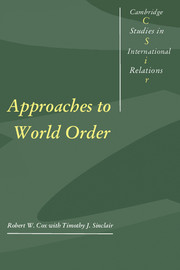Book contents
- Frontmatter
- Contents
- Preface
- Acknowledgements
- Part I Overviews
- Part II Theory
- 3 The idea of international labor regulation (1953)
- 4 Realism, positivism, and historicism (1985)
- 5 On thinking about future world order (1976)
- 6 Social forces, states, and world orders: beyond international relations theory (1981)
- 7 Gramsci, hegemony, and international relations: an essay in method (1983)
- 8 Towards a posthegemonic conceptualization of world order: reflections on the relevancy of Ibn Khaldun (1992)
- 9 “Take six eggs”: theory, finance, and the real economy in the work of Susan Strange (1992)
- Part III Interpretations
- Part IV Multilateralism
- Complete bibliography of works by Robert W. Cox to 1995
- Index of names
- Index of subjects
- CAMBRIDGE STUDIES IN INTERNATIONAL RELATIONS
5 - On thinking about future world order (1976)
Published online by Cambridge University Press: 05 June 2012
- Frontmatter
- Contents
- Preface
- Acknowledgements
- Part I Overviews
- Part II Theory
- 3 The idea of international labor regulation (1953)
- 4 Realism, positivism, and historicism (1985)
- 5 On thinking about future world order (1976)
- 6 Social forces, states, and world orders: beyond international relations theory (1981)
- 7 Gramsci, hegemony, and international relations: an essay in method (1983)
- 8 Towards a posthegemonic conceptualization of world order: reflections on the relevancy of Ibn Khaldun (1992)
- 9 “Take six eggs”: theory, finance, and the real economy in the work of Susan Strange (1992)
- Part III Interpretations
- Part IV Multilateralism
- Complete bibliography of works by Robert W. Cox to 1995
- Index of names
- Index of subjects
- CAMBRIDGE STUDIES IN INTERNATIONAL RELATIONS
Summary
Daniel Halévy used the term “acceleration of history” in the title of an essay which he conceived at the onset of World War II and revised for republication in its aftermath. Oswald Spengler's diagnosis of a cyclical rise and fall of cultures and civilizations was then well known to Halévy and his contemporaries among the European intelligentsia. Arnold Toynbee had also already published a substantial part of his enquiry into the loss of creativity in civilizations, and the conditions for rebirth. All three were concerned with the problem of world order. They were deeply affected by a pessimistic view of the prospects for western societies. Perhaps their pessimism arose from apprehension that an agreeable and civilized way of life had been irremediably disturbed. Whatever particular sentiments may have sparked their efforts, in order to understand the nature of the crisis they each turned naturally to a reflection upon history. The fact that so many professional historians proclaimed agnosticism concerning the meaning of history was provocation and incentive to take up what these skeptics had eschewed. Indeed, the agnosticism of the professionals appeared as a thin veil covering a declaration of bankruptcy in the linear progressive view of history that had optimistically envisaged the universal triumph of liberal parliamentary polities – a bankruptcy consequent upon the political and economic defaults of liberalism in the Europe of the 1930s.
- Type
- Chapter
- Information
- Approaches to World Order , pp. 60 - 84Publisher: Cambridge University PressPrint publication year: 1996
- 2
- Cited by

